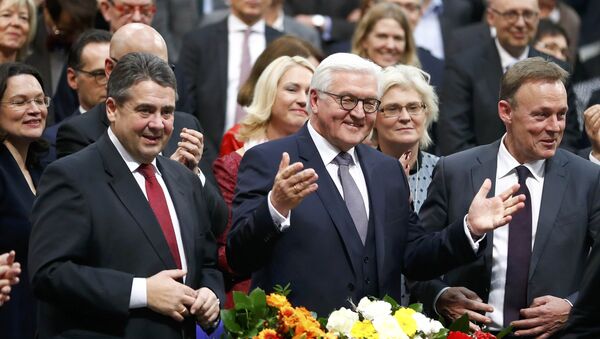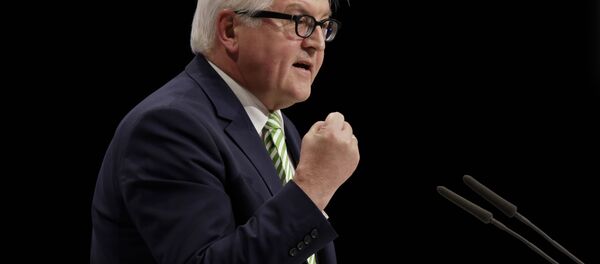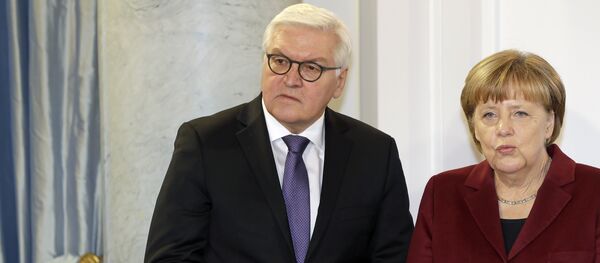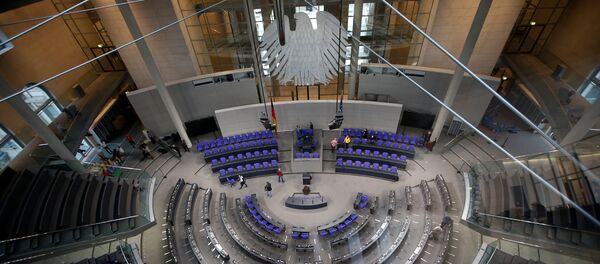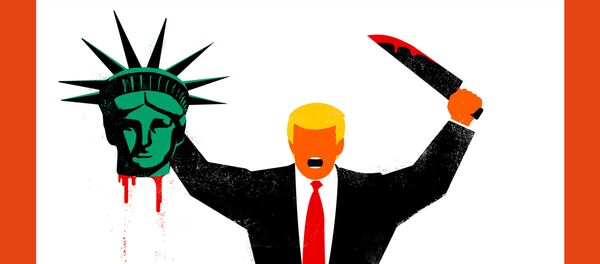Steinmeier left his post as foreign minister last month to seek the presidency, following President Joachim Gauck's announcement last June that he would not seek a second term due to old age.
Steinmeier, 61, is a veteran Social Democratic Party (SPD) politician whose career in federal politics goes back to the late 1990s. In November, he was approved as candidate for the presidency for the country's ruling coalition government, which includes the SPD and the Chancellor Angela Merkel's Christian Democratic Union (CDU).
Steinmeier will officially step into the office on March 17, when Gauck's term expires.
Implications for Russian-German Relations
Most observers admit that the German presidency as a post that is "largely procedural" and ceremonial, something inherent to the Federal Republic's post-WWII constitution, which aimed to avoid deadlock and political inertia stemming from competing sources of power, which helped fuel Adolf Hitler's rise during the interwar period. Others, however, have pointed out that Steinmeier's background and status, both in Germany and abroad, will add significance to the post, particularly in light of his senior role in the SPD.
As to what impact Steinmeier's election will have on Russian-German relations, Moscow seems to expect at least a slight improvement, particularly compared to the state of affairs under President Gauck.
President Vladimir Putin became one of the first foreign leaders to congratulate President-elect Steinmeier on Sunday, sending him a congratulatory telegram which expressed his hope that constructive dialogue, along with cooperation aimed at strengthening stability and security in Europe, would continue under the incoming president. Putin also invited Steinmeier to visit Russia at his convenience, according to a statement put out by the Kremlin.
Steinmeier, meanwhile, has made it a habit of visiting Moscow regularly, even after the outbreak of the crisis in Ukraine, and hinted to reporters Sunday that dialogue and negotiations would be necessary, and cannot be avoided, even with the most "difficult partners."
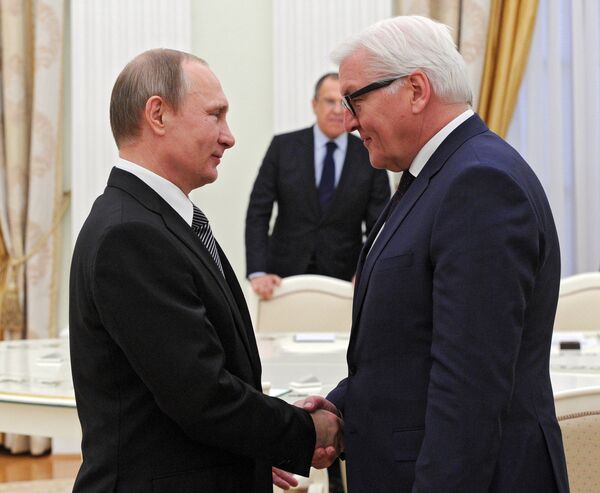
Russian senator and international affairs expert Alexei Pushkov expressed his hope that Steinmeier's election would lead to an era of improved Russian-German relations. "Where President Gauck demanded that Moscow 'repent' for its sins, Steinmeier favors overcoming the conflict with Russia," Pushkov tweeted on Sunday.
Избрание Штайнмайера - плюс для Европы. Если Гаук сводил с нами счеты, требовал "покаяния", Штайнмайер - за преодоление конфликта с Россией.
— Алексей Пушков (@Alexey_Pushkov) 12 февраля 2017 г.
"Steinmeier's election is a good sign for Europe. Where President Gauck demanded that Moscow 'repent' for its sins, Steinmeier favors overcoming the conflict with Russia."
During his time as foreign minister, Steinmeier cautiously pushed for dialogue and a normalization of relations with Moscow, and claimed that attempts to isolate Russia in the international arena made no sense.
Still, not everyone believes that a Steinmeier presidency will lead to any significant changes in Russian-German relations. According to Vladislav Belov, the head of the Center for German Studies at the Russian Academy of Sciences' Institute of Europe, Steinmeier will not be able to go out of his way to push for rapprochement with Russia.
Speaking to RIA Novosti, Belov explained that as president, Steinmeier must "represent the policy of the coalition government, just as he had as foreign minister, where he strictly followed that the decisions that were taken by the government." That, according to the expert, makes any hoped-for rapprochement unlikely, particularly given Berlin's hard line on Russia.
Steinmeier, Belov noted, will certainly be a stronger personality in the presidency, but will have to follow Berlin's policy line. "Based on his professional experience, and given the qualities that characterize him as a professional politician, he will of course be stronger on foreign policy than his predecessors, including Horst Kohler, Christian Wulff and Gauck. But he will not challenge the line – the policy defined by the government," the expert stressed.
At the same time, Meister doesn't think Merkel will oppose Steinmeier's visit to Moscow. Berlin, the analyst noted, has some important reasons – including the crisis in Ukraine, to seek improved relations with Russia. "Merkel has always played a game with Steinmeier: she would step out with a hard line against Moscow, and he, as foreign minister, would try to maintain a softer line. I think that they will continue to work in a similar style in the future," the analyst said.
Dr. Konstantin Vossing, a political scientist at Humboldt University in Berlin, also believes that Moscow should not expect any significant changes in the near future under Steinmeier. Any "hopes for a rapid improvement in relations are unlikely to materialize," he told RIA Novosti. Sanctions, for example, are not in the purview of the president's responsibilities.
For his part, political scientist Alexander Rahr believes that Steinmeier may be the best possible option that Russia can expect from Germany's current stock of politicians. "Of course, Steinmeier shared the Western consensus on Russia, and often criticized Moscow," Rahr noted. "But among Western politicians, he always been the one to say that the confrontation between Europe and Russia must not exist, and supported a common [political and economic] space from Lisbon to Vladivostok."
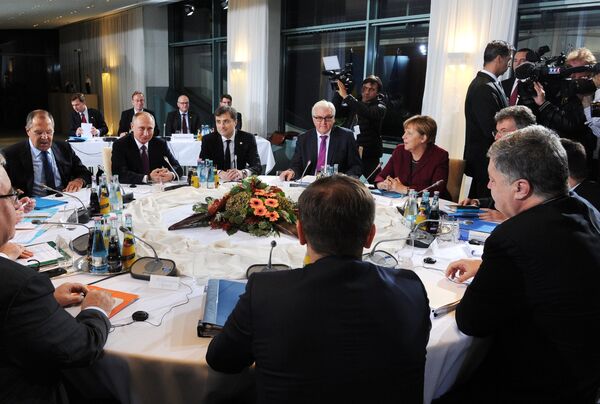
Steinmeier's visit to Russia would be about "correcting the historical mistake" of his predecessor, Rahr noted, adding that the President-elect can be expected to do everything in his power to see that relations are normalized as far as possible.
The Other Side of the Coin: Downturn in German-US Relations
Speaking to ZDF after his election, Steinmeier curiously chose to respond to a question about whether he would seek to improve relations with Moscow by pointing to the changes that are occurring in the transatlantic relationship with the United States, which for many decades has been the keystone of German foreign policy.
"In the past, we were always certain that we would have more difficult negotiating partners in the east," Steinmeier said. "Suddenly, we're confronted with a situation where we'll at the very least have to deal with uncertainty, but also difficulties in trans-Atlantic relations," he added. The world, the President-elect noted, now faces "a complete reordering of international relations."
Observers say that the crux of the conflict between Trump and Berlin stems from the fact that for the first time since the late 1940s, Germany faces a US president who is opposed to European integration, or at least to contributing American resources toward its realization.
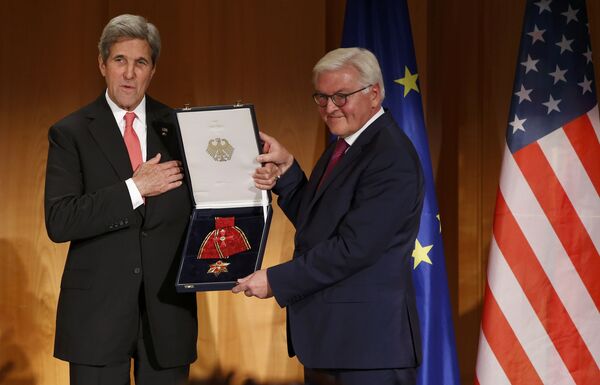
In his first speech following his election, Steinmeier hinted that European integration would be a top priority for him as president. "We must have the courage to preserve freedom and democracy in a united Europe. We want to defend and must defend this foundation, which is not invulnerable. We are not living on an island of tranquility, but are part of this world, with all of its risks," Steinmeier said.
If Steinmeier is correct, and the German-US relationship does sour, the logical question that arises is: with all the problems Berlin faces at home (including economic slowdown, the migrant crisis, and the threat of terrorism) can it really avoid at least limited rapprochement with Moscow? The alternative is facing a politically hostile US to the west, an ambivalent Russia to the east, and the accumulated socio-economic problems in the EU all by itself.

